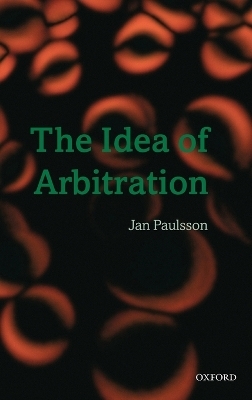
The Idea of Arbitration
Oxford University Press (Verlag)
978-0-19-956416-3 (ISBN)
What is arbitration? This volume provides a novel theoretical examination of the concept of arbitration, attempting to answer fundamental questions which have rarely been addressed systematically in English. It explores the place of arbitration in the legal process, offering a challenging, yet accessible overview of the field and its theoretical underpinnings and contending that arbitration is important enough to be understood in its own terms, as a sui generis feature of social life.
Why do individuals, companies, and States choose to go to arbitration rather than through litigation? Arbitration can offer increased flexibility and confidentiality, and provides the parties with the opportunity to select the arbitrators. But what makes them want to confide in an arbitrator rather than use the more traditional legal mechanisms for settling disputes?
This volume explores what the parties can expect of an arbitrator, and whether and how the conduct of an arbitrator might be questioned and under what authority. It examines the ethical challenges to arbitral authority and its moral hazards, evaluating the promises and dangers of self-contained systems of decision-making and compliance.
Jan Paulsson holds the Michael Klein Distinguished Scholar Chair at the University of Miami School of Law, and frequently acts as advocate or arbitrator in international disputes. For 20 years, he headed the international arbitration and public international law groups at the law firm Freshfields.
1. Arbitral Omnipotence? ; 1.1 The magic of arbitration ; 1.2 The generous impulse ; 1.3 What is a successful arbitration? ; 1.4 What law creates arbitration? ; 1.5 What law does arbitration create? ; 2. The public challenge ; 2.1 The old debate: contractual or judicial? ; 2.2 A better premise: sui generis ; 2.3 Protecting the weak ; 2.4 Arbitrability ; 2.5 Public policy ; 3. Private challenges: disappointed litigants ; 3.1 Authority to decide jurisdiction ; 3.2 Jurisdiction v. admissibility ; 3.3 Severability ; 3.4 The right to be heard ; 3.5 Asymmetries ; 4. Private challenges: third parties ; 4.1 Beneficiaries or obligors in contract ; 4.2 Members of associations ; 4.3 Shareholders ; 4.4 Creditors ; 5. Ethical challenges ; 5.1 Money ; 5.2 Influence ; 5.3 Self-aggrandizement ; 5.4 Fitness to serve ; 6. International challenges ; 6.1 Clashes of culture ; 6.2 Inherent inequality of the parties ; 6.3 Inherent advantages of some parties ; 6.4 Private power v. the public interest? ; 7. Arbitration unbound? ; 7.1 The erosion of state power ; 7.2 The power vacuum filled ; 7.3 A fluid legal universe ; 7.4 Is this law? ; 8. Freedom and empowerment ; 8.1 Self-governance ; 8.2 Virtuous circles ; 8.3 The future
| Erscheint lt. Verlag | 21.11.2013 |
|---|---|
| Reihe/Serie | Clarendon Law Series |
| Verlagsort | Oxford |
| Sprache | englisch |
| Maße | 162 x 238 mm |
| Gewicht | 652 g |
| Themenwelt | Recht / Steuern ► EU / Internationales Recht |
| Recht / Steuern ► Privatrecht / Bürgerliches Recht ► Zivilverfahrensrecht | |
| ISBN-10 | 0-19-956416-7 / 0199564167 |
| ISBN-13 | 978-0-19-956416-3 / 9780199564163 |
| Zustand | Neuware |
| Informationen gemäß Produktsicherheitsverordnung (GPSR) | |
| Haben Sie eine Frage zum Produkt? |
aus dem Bereich


